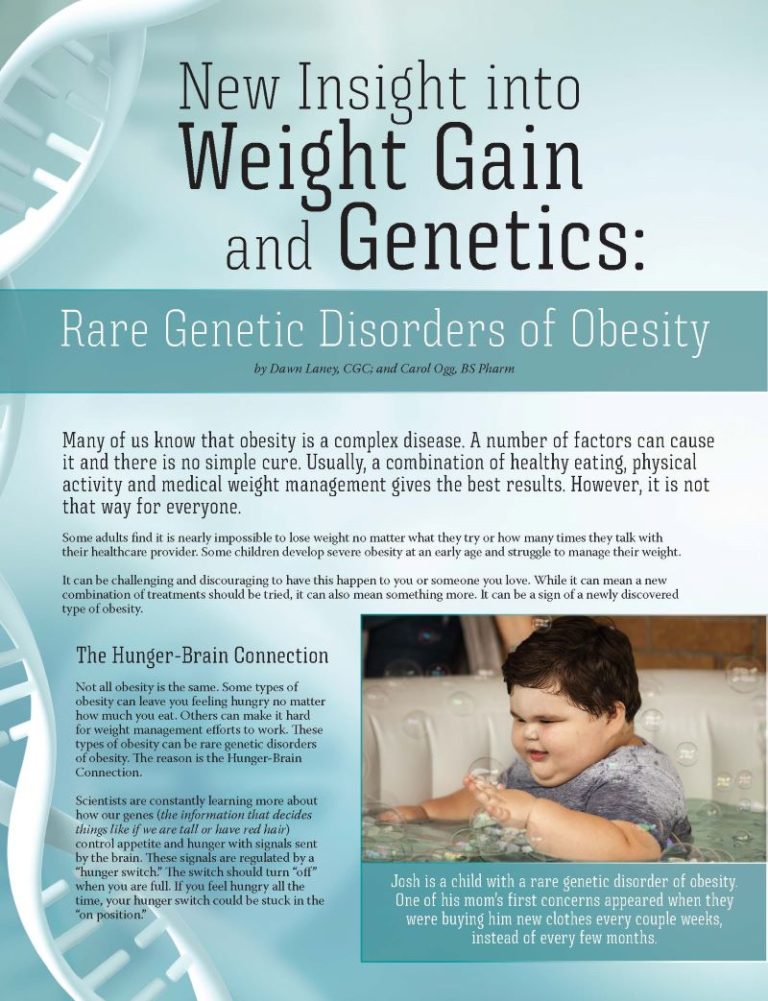New Insight into Weight Gain and Genetics


by Dawn Laney, CGC; and Carol Ogg, BS Pharm
Spring 2019
Many of us know that obesity is a complex disease. A number of factors can cause it and there is no simple cure. Usually, a combination of healthy eating, physical activity and medical weight management gives the best results. However, it is not that way for everyone.
Some adults find it is nearly impossible to lose weight no matter what they try or how many times they talk with their healthcare provider. Some children develop severe obesity at an early age and struggle to manage their weight.
It can be challenging and discouraging to have this happen to you or someone you love. While it can mean a new combination of treatments should be tried, it can also mean something more. It can be a sign of a newly discovered type of obesity.
The Hunger-Brain Connection
Not all obesity is the same. Some types of obesity can leave you feeling hungry no matter how much you eat. Others can make it hard for weight management efforts to work. These types of obesity can be rare genetic disorders of obesity. The reason is the Hunger-Brain Connection.
Scientists are constantly learning more about how our genes (the information that decides things like if we are tall or have red hair) control appetite and hunger with signals sent by the brain. These signals are regulated by a “hunger switch.” The switch should turn “off” when you are full. If you feel hungry all the time, your hunger switch could be stuck in the “on position.”
What is Hunger?
This might come as a surprise: Hunger doesn’t start in your stomach. Hunger starts in your brain.
In a perfect world, the signals in your brain act like a traffic light. When they “turn green,” they tell you that your body needs more fuel and to eat. After eating, these signals “turn red” and tell you that you’re full and to stop eating.
If the signal switch in the brain is broken, the signal from your brain that says, “You’re full and it’s time to stop eating,” never arrives. disorders of obesity.
Rare genetic disorders of obesity are caused by a broken signal from your brain. The signal can never “turn red” or tell your body that you are full. The signal process in the brain that controls hunger is a called the melanocortin-4 receptor (MC4R) pathway. Scientists continue to learn more about this pathway and how it works in people living with rare genetic disorders of obesity.
This research has taught us that:
- Weight and hunger are controlled and regulated by genes and signals in your body.
- If the signals for weight gain and hunger are broken, it may cause severe obesity in young children and excessive, never- ending hunger in all ages.
- There are many signals that control hunger, eating, feeling full and storing fat.
- If any signal is broken, issues with appetite, hunger, calorie burning and others can happen.
How Do You Know if You Have a Rare Genetic Disorder of Obesity?
There are three main signs and symptoms that you should look for:
- Severe obesity at a young age: an infant or child who quickly gains weight, as early as a few months old
- Never-ending hunger: when you can’t stop your hunger cravings, no matter how much you eat
- Inability to lose weight: when you struggle to lose weight, even with very healthy eating and a lot of physical activity
Please see your healthcare provider (HCP) if you think you may have a rare genetic disorder of obesity. Your HCP might send you to see a specialist or recommend genetic testing. It is important to talk about your results with your HCP and a genetic counselor.
Genetic counselors are specialists that can help schedule testing and explain results. They can also help you understand treatment options. If you live in the United States, a list of genetic counselors in your area can be found at the National Society of Genetic Counselors: Nsgc.Org/page/find-a-genetic-counselor.
Conclusion
Rare genetic disorders of obesity are not common. Scientists are working to learn more about how signals for hunger and weight gain connect to your brain. This research will help with testing and treatment options.
To learn more, please visit:
LEADforRareObesity.com: for help finding support, information or how to talk with your healthcare provider.
ThinkGenetic.com: for information about specific rare genetic disorders of obesity.
About the Authors:
Dawn Jacob Laney, MS, CGC, CCRC, is a genetic counselor, assistant professor, clinical researcher and director of the genetic clinical trials center in the Department of Human Genetics at Emory University in Atlanta, Georgia. She is a co-founder of ThinkGenetic, Inc., which empowers patients who want to know about possible genetic causes for their medical issues or obtain real-life answers to their questions about the impact of living with a genetic disease. Ms. Laney also enjoys writing children’s books (some of which are not about living with a genetic disorder).
Carol Ogg, BS Pharm, is a licensed clinical pharmacist and President of The COCo Consulting Group, LLC, specializing in rare genetic disorders. Carol is a critical advisor and consultant to ThinkGenetic, Inc., focusing on reducing the time to diagnose rare genetic conditions. Carol’s direct patient care experience makes her a valuable advocate in educating the community with essential and actionable information. Prior to joining the ThinkGenetic team, Carol held leadership roles in the biotech industry and was instrumental in launching greater than a dozen products to meet the unmet needs of patients around the globe living with rare genetic disorders.
by Sarah Ro, MD; and Young Whang, MD, PhD Fall 2023 Mary, a postmenopausal woman with a…
Read Articleby Rachel Engelhart, RD; Kelly Donahue, PhD; and Renu Mansukhani, MD Summer 2023 Welcome to the first…
Read Articleby Sarah Bramblette, MSHL Summer 2023 In the final months of 2022, I experienced both the worst…
Read Article









